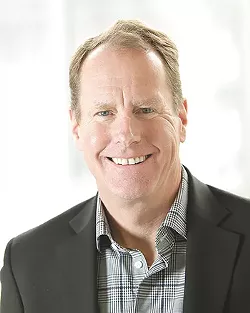Jim Fowler's first exposure to the Inland Northwest was recreation-based; from 1992-96, he was co-owner of the Lookout Pass Ski & Recreation Area and lived in Wallace, Idaho. It was also his first experience as an entrepreneur. Fowler never lost his passion, however, for this place. In fact, he lives in Liberty Lake now.
Fowler grew up in California and went to college in Colorado — thus his love of skiing. After a variety of sales positions in the tech industry, in 2003 he founded Jigsaw in Silicon Valley. Jigsaw became a leading provider of business information and data services, uniquely leveraging user-generated content contributed by a global business-to-business community. Jigsaw, which enabled access to contact information and company profiles for millions of individual and corporate users, raised a total of $18 million from top-tier venture capital funds and ultimately was sold to Salesforce in 2010 for $175 million. Along the way, Fowler built a sales and service center in Spokane that employed more than 100 people at the time of the acquisition. The company continues to have a presence in Spokane, with an office on Mirabeau Parkway.
Like most serial entrepreneurs, Fowler moved on to start a new company. In 2011, he founded Owler, which crowdsources business insights by providing news alerts, company profiles and polls, and allows members to follow, track and research companies in real time. The service currently has more than 1 million active users, and Owler has raised $19 million, again from leading venture capital funds.
Although Owler is based in San Mateo, California, with an office in India, the company recently leased space in downtown Spokane's Steam Plant Square. Owler has seven employees in Spokane, yet Fowler says, "We will quickly have more employees in our Spokane office than in San Mateo."
Fowler is worth listening to because he understands both Spokane and Silicon Valley; he believes Spokane is a highly attractive place to scale emerging companies. He says the local labor force has a work ethic comparable to Vikings — pointing to two Spokane arterials, Freya and Thor, that are named after Norse gods. The workforce, he says, is also "highly educated and fueled by five universities having a presence in Spokane, and several more in the vicinity."
Add in the four ski resorts, the three large lakes and numerous smaller ones, and "talent becomes easier to source than in Silicon Valley. And," he adds, "there are no issues of musical chairs among employees."
Fowler goes on to talk about the abundance of old brick buildings offering wide-open spaces, award-winning wineries, the "blowing-up food scene" and contemporary art galleries.
"Crack open Spokane, and all the pieces are there," Fowler says. "We just need a mentality that embraces and welcomes innovation, creativity and risk-taking."
Then, of course, there's affordability. Fowler references a key Owler employee who left a cramped, inner-city apartment in San Francisco, paying $2,000 a month, and secured a spacious South Hill home with a smaller monthly payment.
Fowler, who lives in Liberty Lake, commutes among Owler's three offices. He views this area as being an "awesome place" and says he doesn't want the region "to become a Silicon Valley or Seattle."
"We need," he adds, "to be sure to preserve the great attributes of Spokane."
To encourage more successful entrepreneurs, and to draw additional tech talent, Fowler believes that this community needs to "pick a focus." He's been supportive of the effort to brand the region as a hub for robotics, yet he also believe there's a "massive" opportunity to leverage our health care domain expertise to create "market separation."
"We can't be too general," Fowler concludes. "Just being a tech hub is too broad."
If Spokane is going to rise above the rest, Fowler asserts that "entrepreneurs in the region will have to make it happen. Free markets are the most efficient mechanisms on the planet, [yet we need] business-friendly laws to ensure entrepreneurs feel welcome."
Ultimately, Fowler believes three partners need to be aligned — "to sing from the same hymnbook," as he puts it. Entrepreneurs themselves need to be activated to do about half of the heavy lifting, while city and/or local governments and local economic development groups should each pitch in about 25 percent of the effort it will take to pick that focus, and share it with the world outside the 509.
In terms of timing, Fowler says "there's never enough time. We need a sense of urgency. I have a son in high school, and I hope our region will have the attraction, infrastructure and resources to enable him to work for, or start, a super-successful innovative company here without having to go to Seattle or the Valley." ♦
Tom Simpson is an entrepreneur, angel investor and advisor to startups and other businesses in the Spokane region. You can reach him at [email protected].
















